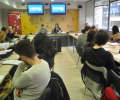“Operation Reka“ Dossier Presented
 The Humanitarian Law Center (HLC) presented the „Operation Reka“ Dossier on October 23rd, 2015. The Dossier offers an overview of the events which occurred on April 27th and 28th, 1999, in the villages located west of the town of Đakovica in Kosovo, when the comprehensive joint operation by Yugoslav Army (VJ) and the Ministry of the Interior (MUP) called „Operation Reka“ was launched. During this Operation, members of the Serbian forces killed at least 350 civilians – Kosovo Albanians, and deported several thousand other civilians to Albania. The bodies of 309 victims were found in 2001 in secret mass grave sites in a suburb of Belgrade. The youngest victim was 15 years old.
The Humanitarian Law Center (HLC) presented the „Operation Reka“ Dossier on October 23rd, 2015. The Dossier offers an overview of the events which occurred on April 27th and 28th, 1999, in the villages located west of the town of Đakovica in Kosovo, when the comprehensive joint operation by Yugoslav Army (VJ) and the Ministry of the Interior (MUP) called „Operation Reka“ was launched. During this Operation, members of the Serbian forces killed at least 350 civilians – Kosovo Albanians, and deported several thousand other civilians to Albania. The bodies of 309 victims were found in 2001 in secret mass grave sites in a suburb of Belgrade. The youngest victim was 15 years old.
In the opening remarks of the conference, the HLC Executive Director Sandra Orlović stated that the Dossier is intended to be a reminder and call for acceptance of responsibility for some of the most serious crimes committed in the former Yugoslavia. At the same time, this Dossier points, to a much greater extent than previous Dossiers, at the prevailing impunity for war crimes in Serbia.
“Operation Reka“ Dossier Presented
During the research, the HLC identified at least 10 different units which took part in this military and police operation, and some 20 individuals whose role in the events on the territory of the Municipality of Đakovica in the given period should be investigated. The most prominent individual among them is Momir Stojanović, the then Chief of the Priština Corps Security Department, and today a Member of the Republic of Serbia National Assembly and Chairman of its Committee for the Control of Security Services. In March 2015, Interpol issued arrest warrants for 17 members of Serbian security forces, which are closely related to the events which took place in the Reka Valley in April 1999. The civilian and military leadership of Serbia has been convicted of this crime before ICTY, whereas no one has been prosecuted for this crime before the courts in Serbia to date.
Ms. Orlović emphasized that „Operation Reka“ represents an example of an orchestrated operation by the VJ and MUP aimed at the deportation of Albanians from the Municipality of Đakovica, and therefore, it represents an example of a pattern followed by the Serbian forces in Kosovo in the commission of the crimes in Kosovo.
Milica Kostić, HLC Legal Director, emphasized this as well. The banishment of citizens, their deportation to the border with Albania and the destruction of their personal documents would seem to have been designed to prevent them from returning to Kosovo. Describing the pattern of actions undertaken by Serbian forces in the deportation of Albanians from the Reka Valley, she stated that they would, first of all, chase the citizens out of their houses and send them in convoys moving towards Albania; before this, they would rob them of their possessions and separate men and boys from the convoy, whom they then killed. Only in the village of Korenica 68 civilians were killed. Ms. Kostić highlighted that a number of military and police documents, as well as testimonies given by members of the VJ, point indisputably to the fact that VJ and MUP units operated in this village on the day of the commission of the crime.
Ivana Žanić, an HLC Legal Analyst, spoke about the forced relocation of civilians from the villages in the area of Đakovica and the evidence proving that the entire territory in the vicinity of Meje was under the control and blockade of the Serbian army and police. Convoys of refugees were exposed to abuse and theft, while men were being taken out of the convoy under the barrel of a gun and taken to nearby meadows. The number of men who were separated in this way was 274, 30 of whom were juveniles. 252 bodies, out of the 274 men killed, were found in the mass graves in Batajnica, 10 bodies in Meje and the surrounding villages, while 12 persons are still reported as missing.
Ms. Žanić emphasized that today there is no information on the exact circumstances of the killing of all the men from Meje, because it is one of the rare crimes committed in Kosovo which left no survivors. However, one of the witnesses and an eyewitness of the theft and separation of men, a former member of the VJ, stated in a trial before the ICTY that he saw police members taking several groups of men to a farm nearby, and that he then heard shots coming from this direction. Later that day, he saw bodies of killed men on this farm. When he asked what was going on with the Albanians, one member of the Serbian forces told him „we are slaughtering Shiptars“.
The autopsy conducted on the mortal remains exhumed from the mass graves in Batajnica showed that all of the killed had gun-shot wounds, while the ICTY established that all of the men separated in Meje were civilians, had no weapons at the time of the separation and they did not take part in the combat.
Lush Krasniqi, from the village of Ramoc ,was a witness of the separation of men from women and the elderly, and his two brothers and an uncle were among the men who were separated. Their mortal remains were found in the mass grave in Batajnica.
Lush stated how he heard gun fire on the morning of April 27th, 1999, and soon saw the smoke coming from the houses, which had been set on fire. He was preparing with his family to leave the house in order to hide in the nearby forest. However, the entire village was soon surrounded by the army and the citizens were made to go to an intersection where tractors were ready. There, they separated the men and boys, from 15 years old upwards, including his brothers and uncle. The other civilians were ordered to move towards Korenica. On their way to Korenica, they were abused and robbed, and Lush recognized some of the police officers as his former acquaintances. Their convoy of about 100 refugees arrived in Korenica that same night, and then continued to Meja. Lush stayed in Meja with his family until June 11th, 1999. On returning to their village, he found his house burnt down.
From the individuals responsible for and direct perpetrators of the crimes committed, Lush today expects the truth about them and the reasons for their participation in these atrocities. He stated that the war in Kosovo has taken 25 years out of the lives of everyone, and that in the end neither the Serbs nor the Albanians are the winners, but only the politicians. That is the reason why institutions should be cleared of individuals who were involved in the commission of such crimes; if this is not done, by ignoring the victims of the crimes, the conditions for future conflicts will be created.
Download the “Operation Reka” Dossier here.





















